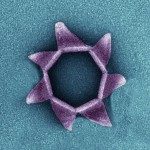Link to Pubmed [PMID] – 21572966
PLoS ONE 2011;6(5):e19893
The Microviridae comprises icosahedral lytic viruses with circular single-stranded DNA genomes. The family is divided into two distinct groups based on genome characteristics and virion structure. Viruses infecting enterobacteria belong to the genus Microvirus, whereas those infecting obligate parasitic bacteria, such as Chlamydia, Spiroplasma and Bdellovibrio, are classified into a subfamily, the Gokushovirinae. Recent metagenomic studies suggest that members of the Microviridae might also play an important role in marine environments. In this study we present the identification and characterization of Microviridae-related prophages integrated in the genomes of species of the Bacteroidetes, a phylum not previously known to be associated with microviruses. Searches against metagenomic databases revealed the presence of highly similar sequences in the human gut. This is the first report indicating that viruses of the Microviridae lysogenize their hosts. Absence of associated integrase-coding genes and apparent recombination with dif-like sequences suggests that Bacteroidetes-associated microviruses are likely to rely on the cellular chromosome dimer resolution machinery. Phylogenetic analysis of the putative major capsid proteins places the identified proviruses into a group separate from the previously characterized microviruses and gokushoviruses, suggesting that the genetic diversity and host range of bacteriophages in the family Microviridae is wider than currently appreciated.
